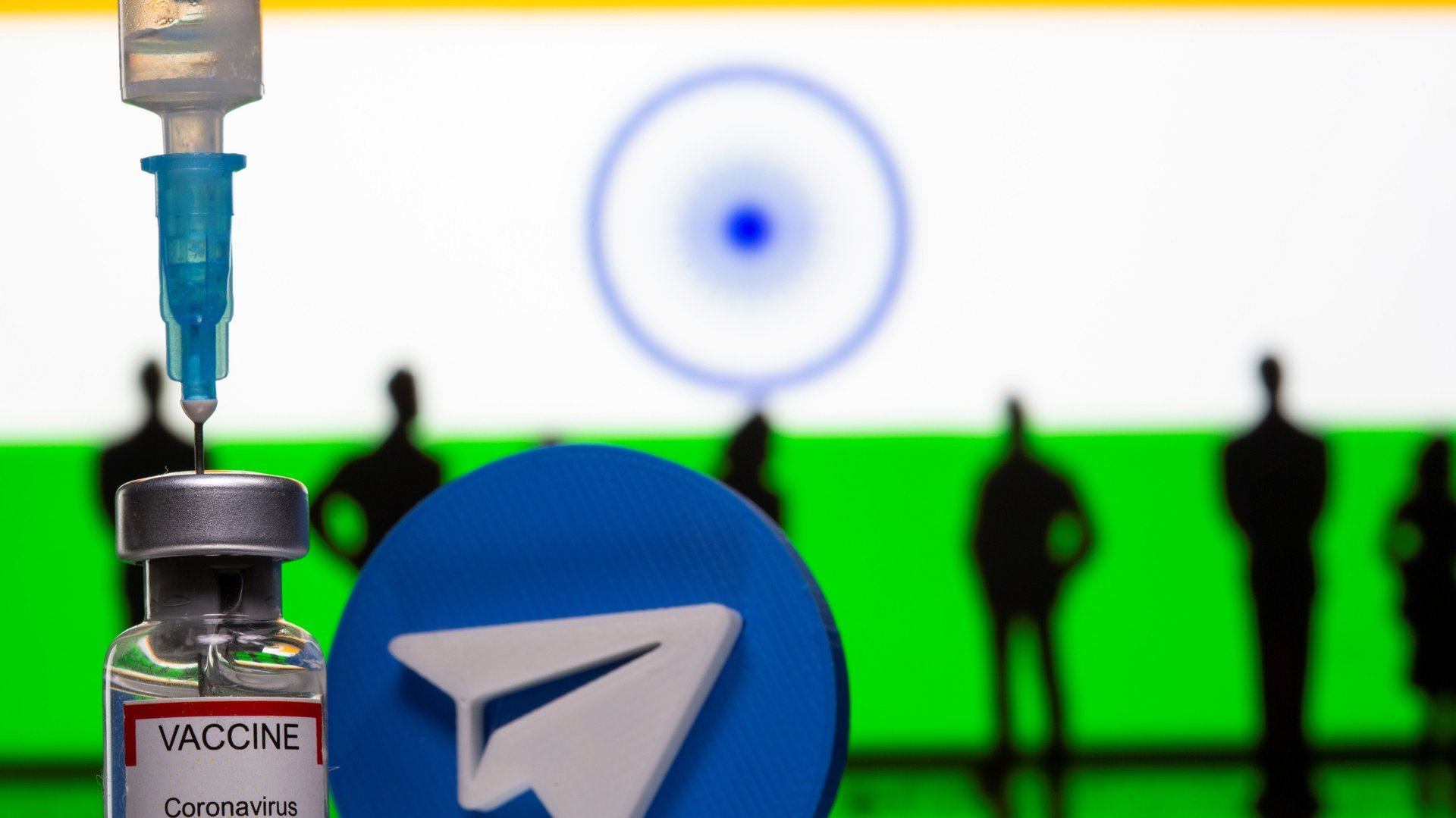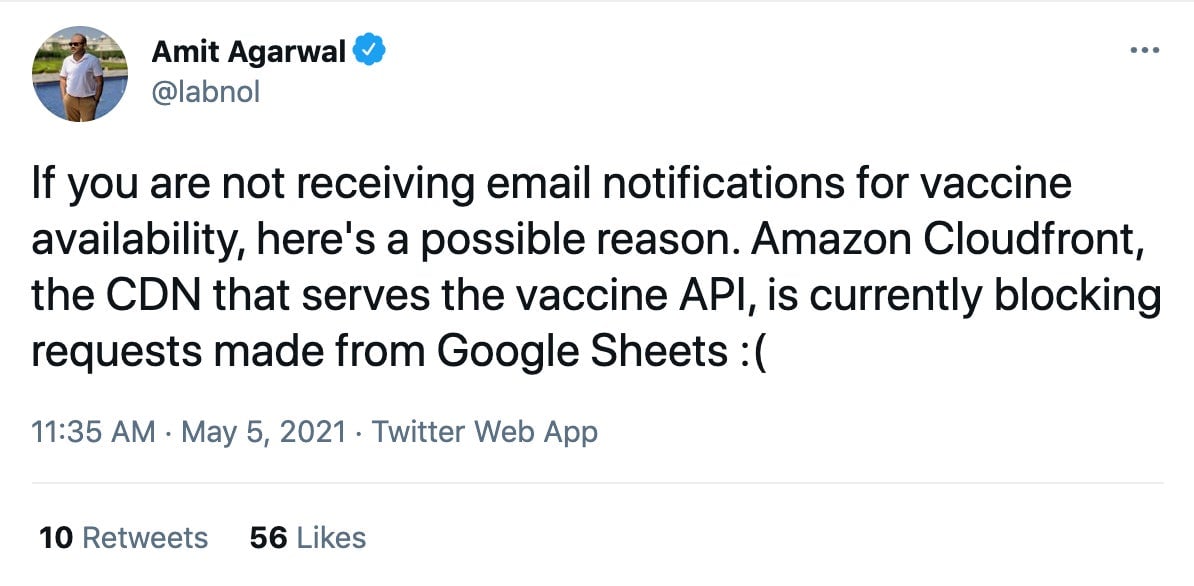Indian techies have found workarounds to the government’s inefficient vaccine booking system
India’s technological prowess has come to the fore at a time when the country’s government has struggled to make much of an impact.


India’s technological prowess has come to the fore at a time when the country’s government has struggled to make much of an impact.
Within days of the country opening up its vaccination drive for all adults, a host of techies and tech startups have stepped up to solve issues relating to Cowin, the government platform for booking vaccine appointments. From launching websites that generate emails when vaccine slots open up to sending notifications via instant messaging apps, Indian techies are working overtime to make the vaccination drive runs smoothly.
These simple yet extremely important real-world solutions could go a long way in helping people get vaccinated in an efficient and orderly manner.
The Cowin experience
On April 28, when India opened its vaccination programme for those aged between 18 and 44, getting an appointment was much like the fastest finger first round from the popular television show “Who Wants To Be A Millionaire?.” The slots would open up randomly with no intimation or logic, and so the only way to get an appointment was to keep refreshing the website for hours.
For the 18-44 age group in India, walk-in vaccinations are not allowed. Booking a vaccine appointment via the government’s website or app was often also a glitchy experience with multiple log-in attempts and one-time passwords (OTPs).
West Delhi resident Ritika Bhatia, like thousands of others, tried to find slots for herself, her husband, her brother-in-law and the family cook, for four days, checking the platform five times a day. But she had no luck. “Slots have been opening up at random times with no prior information whatsoever and getting booked out within seconds,” the 31-year-old told Quartz.
Bhatia found a solution to her problem on May 5 when she joined a Telegram group that was notifying members about slots opening up according to their districts. For her area, the group was sending alerts every two minutes or so. Within a couple of hours, she managed to book appointments for all four people at a centre 20 minutes away from her residence.

This Telegram group is just one of the many solutions that are solving this problem.
Telegram, Facebook, and techies
The day the registrations for all adults opened, Indian authorities also opened up the Cowin Application Programming Interface (API)—a software intermediary that allows two applications to talk to each other— to all developers.
Since then, several Indian techies have created solutions that are making the vaccine process smoother. Alerts like the one Bhatia received can be set up via a website called Under45.in, created by Chennai-based developer Berty Thomas. A user needs to submit her/his state and district to get alerts on Telegram when vaccination slots become available at a centre near them through a dedicated channel. The message has information on which centre has available slots, the number of slots available, the date of availability and which brand of vaccine (Covishield or Covaxin) is available there.
The Telegram tool is a step further than the vaccine finder tool Silicon Valley behemoth Facebook launched on April 30, which lets people identify vaccine centre locations and hours of operation around them but does not provide real-time information.
There are also other websites like GetJab.in and FindSlot.in, which send registered people e-mail notifications when slots open up. The former has some 80,000 sign-ups from across 400 districts.
On May 1, an Indian Institute of Technology alumnus, Amit Agarwal, often touted as the founder of professional blogging in India, launched a Google Sheets-based email notification system for vaccine slot.
On May 5, a leading health and fitness app Healthifyme launched Vaccinateme.in, which will help people find the available vaccination slots in real-time in their area or district. It notifies users via SMS, email, or WhatsApp.
Even homegrown payments behemoth Paytm, which had over 39 million daily active users as of June 2020, jumped on the bandwagon on May 6.
While the effort is in the right direction, all these systems aren’t foolproof.
The glitch in the system
Thomas acknowledges the Telegram alerts may not be set up for all districts and pin codes. He invites tweet replies if you can’t find yours.
Sharma’s solution, meanwhile, ran into some issue with its content delivery network (CDN) on May 5.

At 1 pm on May 6, though, FindSlot.in was not able to gather real-time information.

The biggest glitch in India’s vaccine programme continues to be its high dependency on technology.
While the tech hacks are coming to the rescue of tech-savvy urbanites, for many others, a vaccine is still out of reach. “I don’t know how anybody who isn’t extremely privileged, upper middle-class will manage to navigate the booking unless they (the government) change it,” Bhatia said.
So far, just 2% of India’s 1.3 billion people are fully vaccinated. Much of the rural population doesn’t have access to high-speed internet or smartphones to be able to game the system like this.
Rakshith S Ponnathpur, a Bengaluru-based researcher on financial inclusion, warned that several people who need the vaccines “do not even stand a chance in front of those for whom booking a slot is a hackathon problem statement.”
“It is a different thing to use and flaunt these skills to one-up other buyers during online flash sales like (Flipkart’s) Big Billion Day or whatever, but these are life-saving vaccines for which everyone has been waiting for,” he tweeted.
